Fathers Day is a pretty big deal for us humans it provides us with an opportunity to tell our dear old dads just how much we appreciate them for all that they do for us. But lets face it, some dads are better than others, a fact not solely exclusive to the human race. So, we give you our top ten animal dads, native to Africa, and relay the good and the bad of their parenting skills.
1. Lion
The male lions reputation as a father precedes him: known for his lazy and disinterested attitude towards parenting he is rather frowned upon as a dad. As head of the pride he is allowed to lie in the shade and sleep his cares away while the females are out on the hunt. It takes an astronomical 65 pounds of meat to satisfy the appetite of an adult lion, so they have no easy task. Dad is also allowed the first cut of every meal, in spite of his lack of enthusiasm for hunting. However, having a lion for a dad isn't all bad. If his pride is threatened the male lion will step up and protect his family from all comers. With eyesight 5 times that of our own and ears capable of hearing prey up to 2 miles away this is one dad that will see an attack coming a long way off. The male lion is also quite the Casanova, with a pride encompassing 7 or more lionesses and plenty of cubs, 4 out of 5 of which will die before reaching their first birthday. It is therefore important for the male lion to have as many cubs as he can; he only holds his position as head of the pride for a period of 2-3 years, so passing on his good looks while he can is essential.
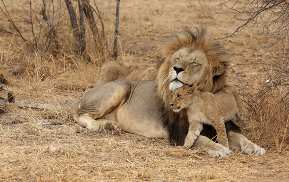
2. African Wild Dog & Black-backed jackal
The African wild dogs ability as a dad might not be as fine tuned as some but that doesn't stop him from doing a good job, especially when it comes to food. The dogs hunt in family packs and can reach speeds of 40 miles per hour while chasing their prey. Once they have their catch they spend little time preparing their meal and get stuck in right away. But being efficient hunters isn't what makes these dads great. Their pups are unable to eat proper solids until they are 10 weeks old and so both mum and dad regurgitate the food they eat to feed their young, something human fathers might not find too appealing. But in doing this it keeps the pups close to home and stops them from falling prey to predators. The black-backed jackal is similar in its culinary habits. He returns from the hunt with food for his mate and newborn pups who, at the age of 1 month, are then capable of eating the regurgitated food of their parents. Lovely, the lengths some parents will go to make sure their kids eat well.
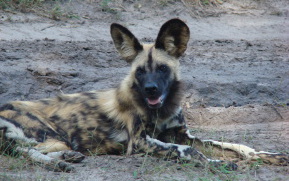
3. The African Jacana
The male African jacana is smaller than his female counterpart and in no way wears the trousers in the relationship, in fact he's a bit of a pushover, but that doesn't mean he's not a good dad. On the contrary, he takes on a host of duties for his brood. After building his nest on a little floating island he goes about finding a mate. However, after mating, the female runs off to breed with other males leaving the male alone to tend to the 4 eggs she has laid. Being a single parent isn't easy for The African jacana: he has to incubate the eggs and, if disturbed - mainly by flooding - has to carry his young under his wings to a safer location.
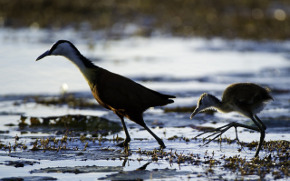
4. Giant African Bullfrog
This amazing dad can be quite a big mouth but in the case of his young that's not a bad thing. The Giant African Bullfrog can have over 6,000 eggs to take care of and protect, so he's developed an ingenious way of doing so. Essentially, he eats them. He keeps his little charges tucked away in his vocal sacs for a period of six weeks, after swallowing them of course. Once the time to hatch arrives he simply vomits them out and his work is done. So, as long as you're comfortable with swallowing your children and then throwing them back up again, the life of a Giant African Bullfrog might not sound too bad.
5. Seahorse
If you're looking for a guy whos in touch with his feminine side then look no further ladies, because you cant get much better than this. The Seahorse is one of the front runners for dad of the year and for one very special reason, that being he takes on the turbulent task of pregnancy. The female places her eggs in a special pouch on the males front and then its all down to dad. He fertilizes the eggs over a period of 10 – 25 days, keeping them nice and safe in his pouch before giving birth to anything between 1 – 2,000 offspring. You are unlikely to find a more dedicated dad, although it has been said they are prone to eating a few of their young, a factor somewhat overshadowed though.
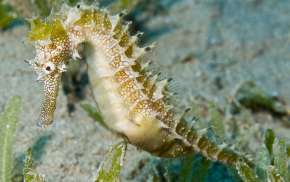
6. Mountain & Lowland Gorilla
In the gorilla is found a particularly solid example of good parenting. At times he might come across a little controlling but overall he is a very good dad. Usually living in family groups of around 30, the large male silverback is always in charge. He places on his broad shoulders the responsibility of finding food and dictates where the group should eat: a pretty big responsibility indeed considering gorillas need up to 50 pounds of food a day. The male gorilla is a big believer in discipline, dining with mum first and then allowing the kids to join in afterwards. He spends a good deal of time with his young and keeps a watchful eye on them right up until their teenage years. This father sets a concrete example of how to behave, settling any arguments within the group and fending off any threats against his family with a fierce display of charging and chest beating.
7. Greater Flamingo
Its all in the name with this one, this flamingo is pretty great, particularly as a dad. They are generally monogamous birds, remaining with the same mate for life. The males are caring and dutiful to their spouses and observe great gender equality - rarely seen in the animal kingdom. Together they select the site of their nest, usually constructed of mud, which dad helps his wife to build. During the period of incubating their egg, the male again shares equal responsibility with the female, together defending and rearing their young hatchling.
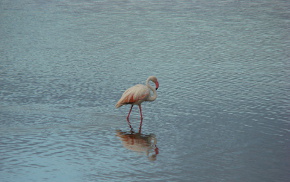
8. Namaqua sand grouse
There is no escaping it, the Kalahari Deserts Namaqua sand grouse is one very committed father. He takes turns with his mate to incubate their eggs, dealing with the long night shift, while she takes over during the day so dad can fly off with fellow fathers in search of food and water. But it is after the hatching of his chicks that this dads time to shine arises. His breast feathers are capable of absorbing water, much like a sponge, and after dipping them in a watering-hole he is able to carry water back to his chicks, providing them with much needed sustenance. However, it is the lengths to which hell go to achieve this that is so incredible and that is meant in a literal sense. With excellent flight capabilities this dad can fly at around 40 miles per hour and is tough enough to achieve a round trip from nest to water and back again of around 100 miles.
9. Termite
A lesser known fact about termites is that there is only one breeding pair out of millions and millions of males and females in one mound. The mother and father of such a brood rarely leave each others side and mate continuously, with the queen constantly pregnant. Dad helps to churn out 5 million kids a year and does so for up to 20 years, making him dad to over one hundred million termite babies. Now that's a lot of dirty nappies! The termite Dad certainly wins the prize for his fidelity and for being the ultimate stud.

10. Weaver
Weaver birds are master craftsmen and are all about building a good strong home for their family. In spite of the fact the species are spread across Asia, Australia and, of course, Africa, the technique these birds employ to build their nests is exactly the same. The males use strong grasses to build their nests and weave them together into a small sphere, creating as many as they can find room to do so. These can often be seen hanging over water, a precautionary measure by the builder to ensure, should the nest fall, it will not be snaffled up by predators. There are big consequences associated with this dads craftsmanship as it can determine whether or not he becomes a father at all. If the female likes the nest he's made shell take up residence immediately and lay eggs in the next few days. If, however, she finds his workmanship a little shabby the male will take it to heart and chase her off. Thereafter living in hope a slightly less hard to please female will come his way.

